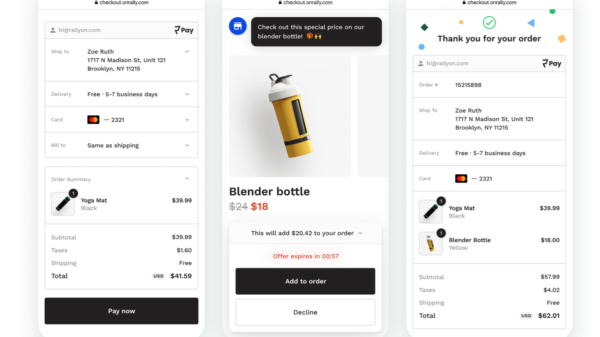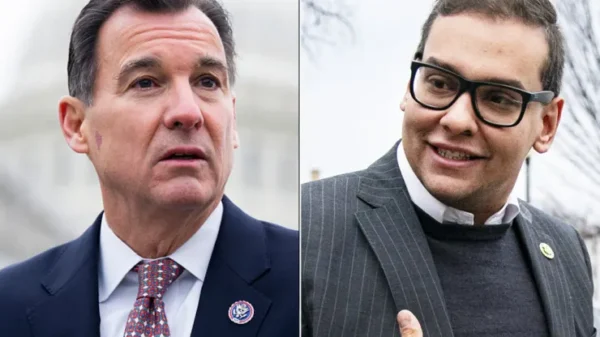Jovem Pan, a group which endorsed Jair Bolsonaro, is facing a legal challenge for spreading misinformation. Its radio licence can be revoked.
The fortunes of Jair Bolsonaro and Jovem Pan have followed similar paths. The Brazilian media group endorsed Bolsonaro unconditionally throughout his Presidency and this move made it thrive. After Brazil’s far-right leader lost the election and Brazil’s capital was raided, Jovem Pan soon went into troubled: the group announced a round of layoffs, its President was replaced and its journalists were challenged in court for spreading dangerous disinformation.
Established in 1942 as a radio station in São Paulo, Jovem Pan is now called the “Brazilian Fox News”. The moniker is appropriate as the network has amplified Bolsonaro’s propaganda in the same way Fox News amplifies Donald Trump’s views. Pro-Bolsonaro rallies frequently featured posters with pictures of the company’s commentators along with the message “the real press.”
The origins of Jovem Pan
Decades before Bolsonaro rose to power, Jovem Pan gained a big following for its news programmes, with a big focus on sports. In 1976, they launched a musical station aimed at a younger audience, and it succeeded with that segment too.
For almost all its history, the group has been run by the Carvalho family, which is still in charge. The Carvalhos are one of the pioneers of broadcasting in Brazil. Entrepreneur Paulo Machado de Carvalho, the grandfather of the current president of the board of Jovem Pan, purchased the radio in 1944. He also took part in the foundation of TV Record, the second most watched TV in Brazil, today owned by a Protestant church.
Jovem Pan’s headquarters are based in an imposing building on São Paulo’s most famous avenue. Today the group operates more than 100 affiliated radio stations across Brazil. It also has almost 25 million YouTube subscribers, and a cable TV channel that was launched at the height of Bolsonaro’s presidency. The company does not disclose the number of journalists in its newsrooms.
On an email, a Jovem Pan spokesperson said the accusations of sharing fake news or hate speech were “false” and added that the group was not authorised to enter into details due to judicial secrecy. The spokesperson also said that the change in the group’s presidency and its commentators was already scheduled before the election, and denied that the group is an outspoken supporter of Bolsonaro.
According to Tony Goes, media correspondent for the newspaper Folha de S. Paulo, Jovem Pan has always been considered an important radio station. He says the group changed in 2015, when Brazil was going through a delicate political moment, right after the impeachment of left-wing former President Dilma Rousseff.
Rousseff’s removal was endorsed enthusiastically at Jovem Pan’s, and the group decided to launch opinionated shows, with an emphasis on one called Os Pingos nos Is, which might be translated as “The dots in the I’s.”
“At the same time, they began filming these programmes in the radio studios and broadcasting them live on YouTube. This move had a significant impact”, Goes says.
Goes explains that the owners saw right-wing audiences as a promising niche, and decided to pursue it. “They realised that putting incendiary commentators on air increased the ratings and they went down that road. That’s how they were transformed into a Brazilian Fox News,” he says.
It was during this same period that Jovem Pan became the most listened-to news radio station in Brazil.
“They started hiring commentators who are not journalists, who have no sources and who do not do the basics of journalism,” Goes says. “When anyone criticises this behaviour, they are immediately called out for restricting free speech.”
The alignment with Bolsonaro’s government reached a point in which the network live-streamed the President’s broadcasts on Thursday evenings. During his speeches, the former president often mentioned Os Pingos nos Is and exclusively answered the friendly questions asked by the programme’s commentators. During an interview for Fox News in June 2022, Bolsonaro referred to Jovem Pan as an “example of journalism”.
Hand in hand
In a gripping feature for the prestigious magazine piauí, reporter Ana Clara Costa told in detail how the meteoric ascent of Bolsonaro and the increasingly incendiary tone of his messages made Jovem Pan’s ratings soar.
Jovem Pan was already a right-wing group. But its alignment with Bolsonaro’s messaging escalated at the beginning of the pandemic. As COVID-19 ravaged Brazil, the former president minimised the severity of the plague, encouraged crowds to ignore safety measures, spread lies about vaccines, and recommended unproven miracle drugs. Bolsonaro also attacked the Supreme Court, which resisted his attempts to end lockdowns.
As the pandemic lingered, Jovem Pan amplified Bolsonaro’s dangerous messages. “When it became clear that the Supreme Court was (as it is to this day) the most solid obstacle to Bolsonaro’s coup plans, Os Pingos nos Is took up the trenches,” Ana Clara Costa recalls. After spreading Bolsonaro’s lies about the pandemic, the broadcaster followed the President’s line again in saying that Brazil’s electronic voting system was vulnerable and that Bolsonaro’s reelection would be threatened by alleged fraud.
The group’s commentators went as far as to attack the station’s own professional reporters who were on the ground offering factual information. On one occasion, a commentator shouted that the news ticker was wrong and said it should be corrected immediately. The ticker was mentioning a Supreme Court investigation into anti-democratic acts organised by Bolsonaro fans. “There is nothing anti-democratic! Our news ticker is wrong and biassed!”, he said.
Growth under Bolsonaro
Adherence to Bolsonaro’s agenda proved to be lucrative for Jovem Pan. The group experienced huge growth. In October 2021 it achieved the founders’ dream and launched its own television channel. Jovem Pan News quickly rose to second place in the news segment during the election, surpassing CNN Brasil’s audience ratings. “This happened despite Jovem Pan’s much more precarious structure. They simply took the Youtube programmes and threw them on TV,” Goes says. This growth took a hit briefly after the election. But the company said it’s recovered in March, according to a survey by Kantar Ibope. It’s important to take into account that cable news is not massive in Brazil: according to Reuters Institute’s survey data, 53% of Brazilians said in 2022 that they never watch cable news.
After launching on cable TV, Jovem Pan has become a unique case in Brazil’s media landscape. The channel broadcasts all of its programmes on multiple platforms: on YouTube, TV, social media and the radio. “It is tough to evaluate the audience on all these platforms since each one uses different measurements and the same consumer might be measured in different channels. But it is estimated that the ‘Jovem Pan universe’ attracts around 50 million people [in a country with a population of 214 million] between viewers and listeners each month,” explains Costa in her piece.
With this remarkable digital footprint, she writes, Jovem Pan has become “the most powerful disinformation hub of Bolsonarismo.” This was precisely the argument used by the Federal Prosecutor’s Office to open an investigation against the group. According to prosecutors, an analysis of their content over several months showed that Jovem Pan had broadcast false news and speeches that undermine the institutional order “in a period that coincides with the escalation of the coup and violent movements across the country.”
The same court order, issued on 9 January 2023, requests YouTube to preserve all videos published by Jovem Pan in 2022. The purpose of the order is to prevent any evidence against the company from being wiped. YouTube was also given 30 days to inform the court of any videos that have been deleted.
The case against Jovem Pan
According to prosecutors, statements discrediting institutions and the democratic process have been gaining ground on Jovem Pan’s programming since mid-2022, even before the start of the electoral period. “The free expression of thought does not exempt Jovem Pan from respecting other constitutional and legal guidelines regarding communication activities, especially since part of its content is broadcast via radio, a public concession subject to relevant limits,” the institution argues.
The investigation will assess whether Jovem Pan violated the fundamental rights of the population and abused the freedom of broadcasting. The channel can be subjected to fines and made to pay compensation for collective moral damages. The government can suspend their broadcasting licence for up to 30 days or even revoke it. No deadline has yet been set for the announcement of a decision.
Ironically, Fox News has almost gone through a defamation trial in the United States. The lawsuit was presented by Dominion Voting Systems after the American broadcaster made false accusations against the company. In its defence, Fox News has used an argument similar to that of Brazil’s Jovem Pan, that it was simply exercising its freedom of expression. In a last-minute settlement on 18 April, the network agreed to pay $787.5 million to Dominion, around half of the $1.6 billion initially sought in the lawsuit.
A few weeks before the court decision to suspend Jovem Pan’s monetisation, YouTube had already announced the demonetisation of Jovem Pan’s channels, thereby preventing the company from generating advertising revenue from its content on the platform. In a statement to the press, the platform clarified that the decision was motivated by “repeated violations of policies against disinformation in elections.” Jovem Pan is also the target of a demonetisation campaign promoted by Sleeping Giants Brasil, a project that warns advertisers about companies that spread disinformation and hate speech.
Humberto Ribeiro, one of the three founders of Sleeping Giants, explains that Jovem Pan caught his attention when they noticed that some traditional media organisations had realised that disinformation could be a great business strategy.
“Jovem Pan took advantage of some people’s desire to consume content that reinforces their personal beliefs,” says Ribeiro. Before targeting Jovem Pan, Sleeping Giants initiated a campaign against TV host Sikera Jr, a staunch Bolsonaro supporter whose regional TV show gained national notoriety for promoting hate speech and misinformation.
The TV station airing Sikera’s show recently announced that they will not be renewing his contract. According to Ribeiro, the work of Sleeping Giants has led to approximately 200 advertisers pulling their support from Sikera and his show. In the case of Jovem Pan, he says, around 60% of the advertisers alerted by the movement ended their campaigns.
Will things get worse?
Jovem Pan’s problems intensified in 2022. The group desperately needed Bolsonaro’s victory in the presidential race, and its pundits’ comments during the campaign caught the attention of authorities. Some Jovem Pan’s political commentators were also embroiled in the legal battle, with many of them having their social media accounts suspended by the Supreme Court. Because of this, for some time the network displayed black tags on its programmes as a way of claiming it was operating under censorship. Bolsonaro’s bravado that he would “impose limits on judges” fuelled the company’s belief that its problems with the Justice would be overcome with the president’s re-election.
However, Lula da Silva narrowly won the election, Bolsonaro flew to the United States and Jovem Pan’s managers came under pressure. In the days that followed the election, many of the pundits who claimed there had been voting fraud resigned.
After the riots in Brasilia, the owner of the company stepped down as president and took over the board of directors. Other commentators left. In the same week, the Federal Prosecutor’s Office decided to open the investigation.
Jovem Pan claimed that all the changes were already planned and that they had no connection with the riots or the election result. However, the group’s editorial line has changed substantially. Jovem Pan is still critical of Lula, but conspiracy theories have disappeared from the airwaves.
As this change happened, Jovem Pan’s audience rates have taken a hit, with some of its shows experiencing a sharp decline in viewership. In the first two weeks of February, for example, the audience of Os Pingos nos Is on Youtube dropped by 75% compared to six months earlier. Similarly, the political show 3 in 1 saw a 64% decline during the same period.
Tony Goes says it is impossible to say whether Jovem Pan will be able to resume a routine of normality. “It’s still too early to say what will happen,” he says. “Perhaps the company will realise that if it softens its discourse too much it will lose its most loyal audience. And there are still many businessmen sympathetic to Bolsonaro willing to finance a project like this. But as I said, it is still too early to make any predictions.”















































